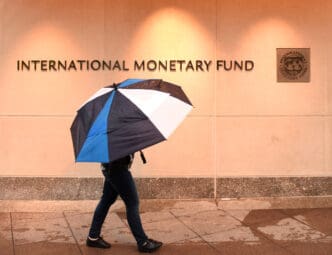Executive Summary
- The International Monetary Fund (IMF) warns it is “premature and incorrect” to conclude that President Trump’s higher tariffs had no impact on global economic growth, despite their effect being smaller than initially anticipated.
- The IMF slightly upgraded global and US growth forecasts for the current year and 2025, attributing the smaller immediate impact of tariffs to negotiated trade agreements, exemptions, and adaptive business strategies.
- Despite current assessments, the IMF emphasizes that trade tensions persist, and the full economic consequences of Trump’s trade policies, including potential cost transfer to consumers, may only become clear over an extended period.
The Story So Far
- The International Monetary Fund’s assessment comes in the context of President Trump’s ongoing “chaotic trade war,” which has involved a series of tariff hikes, pauses, and adjustments, alongside the negotiation of some trade agreements. While the immediate global economic impact of these tariffs has been smaller than initially anticipated due to factors like the US negotiating trade deals and exemptions, other countries refraining from retaliation, and businesses adapting supply chains, the IMF maintains that trade tensions persist and the full, long-term economic consequences, including potential cost pass-through to consumers, remain uncertain and may take considerable time to become clear.
Why This Matters
- Despite President Trump’s tariffs having a smaller-than-anticipated immediate impact on global growth due to mitigating factors like trade deals and adapted supply chains, the IMF cautions against concluding they had no effect, emphasizing that trade tensions persist, existing agreements are not guaranteed, and the full costs may eventually be passed to consumers, with the complete picture taking a long time to emerge.
Who Thinks What?
- The International Monetary Fund (IMF) believes it is “premature and incorrect” to conclude that President Trump’s tariffs have had no impact on global economic growth, despite their effect being smaller than initially anticipated and contributing to a slight upgrade in current global and US growth forecasts.
- The IMF’s chief economist, Pierre-Olivier Gourinchas, cautioned that trade tensions persist and the full long-term economic consequences of the tariffs, including potential cost pass-through to consumers, may only become clear over an extended period.
- President Trump initiated a “chaotic trade war” involving a series of tariff hikes, pauses, and adjustments, and continues to engage in assertive trade actions, including reportedly threatening a 100% tariff on China.
The International Monetary Fund (IMF) has cautioned that it is “premature and incorrect” to conclude that higher tariffs imposed by President Donald Trump have had no impact on global economic growth, despite their effect being smaller than initially anticipated. The assessment, released Tuesday, noted a slight upgrade in global and US growth forecasts for the current year.
Global Economic Outlook
The IMF’s latest World Economic Outlook report indicates that the average US tariff rate has decreased to between 10% and 20% for most countries, a reduction attributed to a series of trade agreements negotiated by the United States. This adjustment, along with a smaller-than-expected increase in the tariffs themselves, contributed to the revised outlook.
Globally, the IMF now projects the world economy to grow by 3.2% in 2025, an increase from its July forecast of 3%. However, this figure remains “decisively below the pre-pandemic average of 3.7%.” The US economy is expected to see growth of 2% in 2025 and 2.1% in 2026, slightly above previous predictions.
Factors Limiting Immediate Impact
IMF chief economist Pierre-Olivier Gourinchas explained that several factors mitigated the immediate global impact of the tariffs. These include the US negotiating various trade deals and providing multiple exemptions, as well as most countries refraining from retaliatory tariff increases on American goods. Businesses also adapted by increasing imports ahead of tariff hikes and “re-routing” supply chains.
Lingering Concerns and Uncertainty
Despite the current assessment, Gourinchas emphasized that trade tensions persist, and there is no guarantee that existing trade agreements will endure. He also highlighted the possibility that US importers might eventually pass the costs of higher tariffs onto consumers, suggesting that “past experience suggests that it may take a long time before the full picture emerges.”
President Trump initiated what the IMF described as a “chaotic trade war” earlier this year, involving a series of tariff hikes, pauses, and adjustments, alongside the negotiation of some trade agreements. Recent developments underscore the ongoing volatility, with Trump reportedly threatening a 100% tariff on China amid a dispute over rare earth export controls.
Key Takeaways
The IMF’s analysis underscores a complex interplay of initial tariff impacts and mitigating factors, while maintaining a cautious stance on the long-term economic consequences of President Trump’s trade policies. The report suggests that the full effects of these measures may only become clear over an extended period.








